Blueberries, those vibrant, antioxidant-rich fruits, have long been celebrated for their nutritional benefits. Packed with vitamins, minerals, and plant compounds, they are often touted as a superfood capable of improving everything from heart health to cognitive function. Yet in recent years, growing attention has been paid to a different question: do blueberries give you energy, and can they meaningfully support stress relief and emotional balance? This seemingly simple inquiry opens the door to a much broader exploration of how food affects both our physiology and our mental state. From their impact on cellular energy production to their role in modulating the nervous system, blueberries represent a fascinating case study in the connection between diet and psychological well-being.
You may also like: Unlock Powerful Stress-Relief with Adaptogenic Mushrooms and Stamina Herbal Support
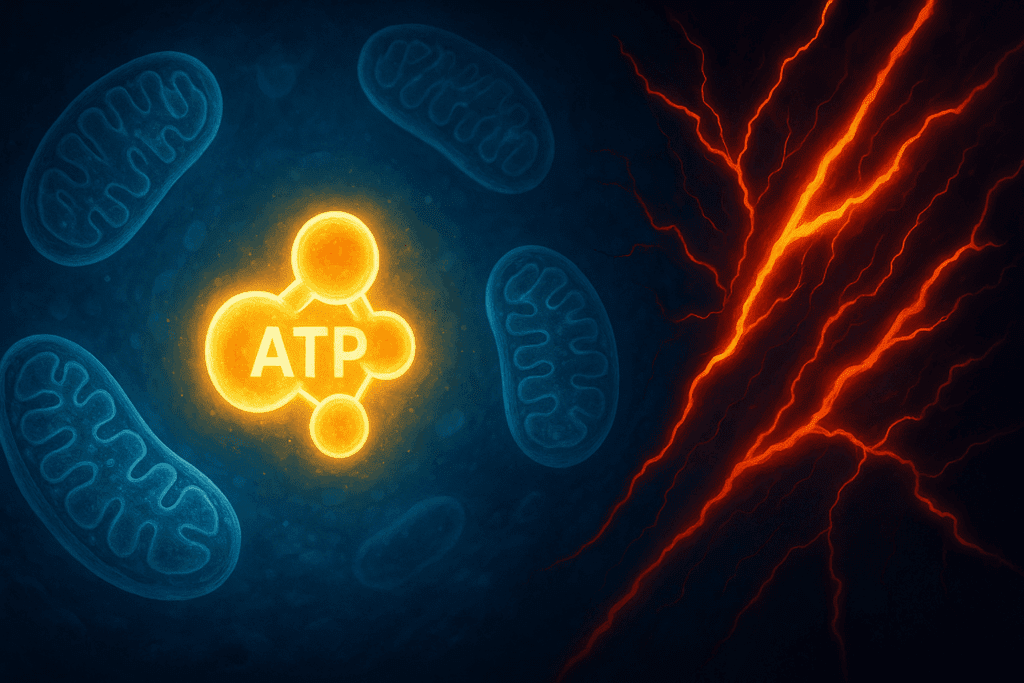
Understanding the Science of Energy and Stress
To appreciate how blueberries might contribute to energy and stress relief, it’s essential to understand what we mean by “energy” and how stress affects the body. In physiological terms, energy refers to the biochemical processes that allow our cells to function, primarily governed by ATP (adenosine triphosphate), the molecule responsible for powering nearly all cellular activities. The production of ATP depends heavily on mitochondrial health, blood sugar regulation, and nutrient availability.
Meanwhile, stress is a physiological and psychological response to perceived threats or challenges. Chronic stress can disrupt energy production by over-activating the hypothalamic-pituitary-adrenal (HPA) axis, leading to hormonal imbalances, inflammation, and oxidative stress. These effects can drain mental and physical energy, making it difficult to focus, sleep, or maintain emotional equilibrium. Therefore, any food that supports mitochondrial function, reduces oxidative stress, or helps regulate cortisol levels can indirectly enhance both energy levels and stress resilience.
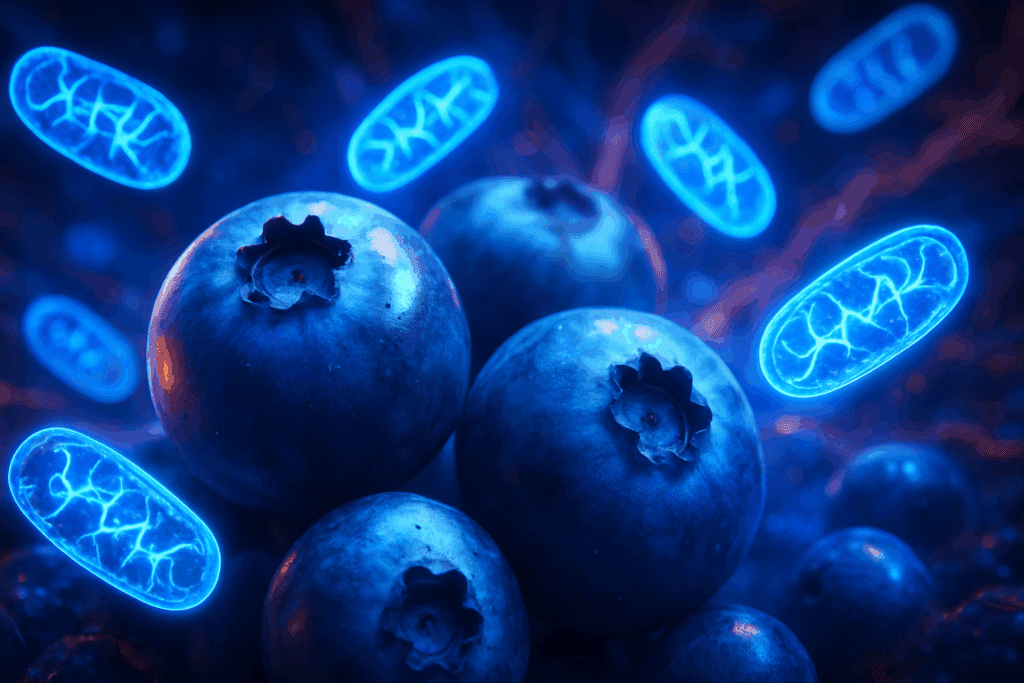
Do Blueberries Give You Energy on a Cellular Level?
The question “do blueberries give you energy” can be answered more precisely when examining their impact on mitochondrial function. Mitochondria are the energy powerhouses of the cell, and their performance directly influences how energetic or fatigued we feel. Blueberries are rich in anthocyanins, a type of flavonoid known to support mitochondrial health by reducing oxidative stress and improving metabolic efficiency.
Several animal studies have shown that blueberry supplementation can enhance mitochondrial biogenesis, particularly in brain and muscle tissue. This means that regular consumption of blueberries may support the production of new mitochondria, thereby boosting cellular energy. In human studies, individuals consuming a blueberry-rich diet have demonstrated improved endurance during physical activities, reduced markers of oxidative stress, and enhanced cognitive performance, all of which contribute to a subjective sense of increased energy.
Furthermore, blueberries contain vitamin C, vitamin K, manganese, and small amounts of B vitamins, all of which play critical roles in cellular metabolism. While blueberries may not provide a quick spike in blood sugar like high-glycemic fruits or processed snacks, they offer a more sustainable form of energy by stabilizing glucose levels and enhancing insulin sensitivity. This steadier energy release makes them particularly valuable for individuals dealing with fatigue linked to blood sugar instability.
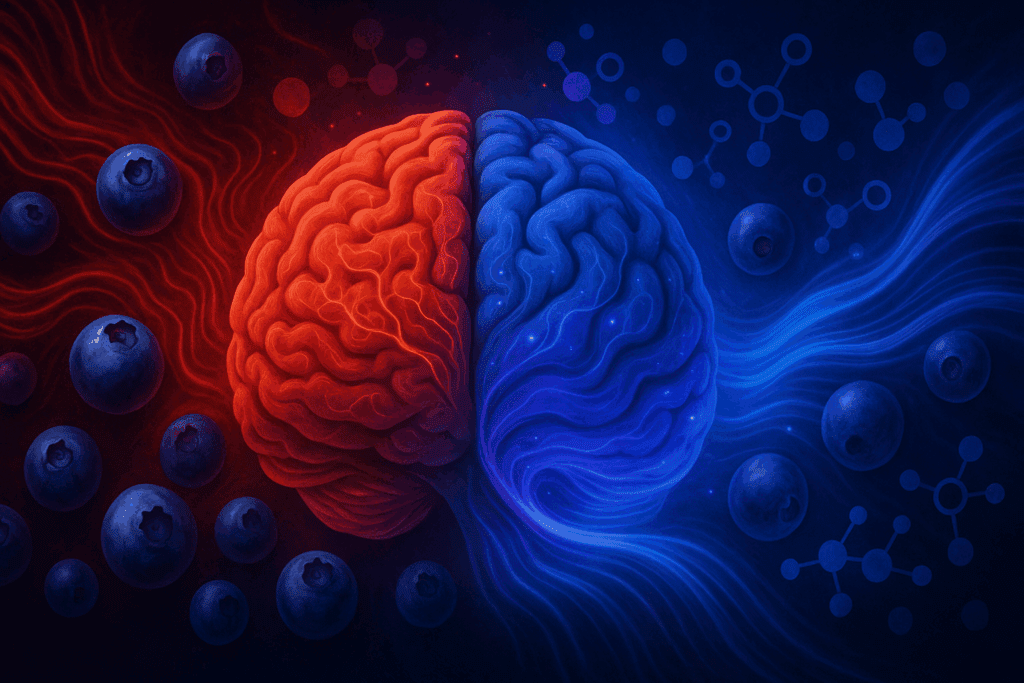
The Role of Blueberries in Stress Relief and Anxiety Support
When discussing stress relief, it is important to consider the relationship between nutrition, neurotransmitter function, and inflammation. Chronic stress is often accompanied by neuroinflammation, disrupted neurotransmitter synthesis, and impaired brain plasticity. Blueberries are uniquely positioned to address these issues due to their high concentration of polyphenols and their ability to cross the blood-brain barrier.
Polyphenols in blueberries have been shown to upregulate brain-derived neurotrophic factor (BDNF), a protein that supports the survival and growth of neurons. Low levels of BDNF are associated with depression and anxiety, while higher levels are linked to improved mood and resilience. In randomized controlled trials, individuals who consumed blueberry supplements or smoothies experienced reductions in symptoms of depression and anxiety, likely due to enhanced BDNF expression and reduced inflammation.
Moreover, the antioxidant properties of blueberries can mitigate the oxidative damage caused by chronic stress. By neutralizing free radicals, these compounds protect neuronal integrity and support optimal neurotransmitter function. For example, the amino acid tryptophan, which is a precursor to serotonin, is vulnerable to oxidative degradation. Consuming antioxidant-rich foods like blueberries helps preserve tryptophan and support serotonin production, further enhancing mood and emotional balance.
Do Blueberries Give You Energy by Balancing Cortisol Levels?
Cortisol, often referred to as the “stress hormone,” plays a crucial role in energy regulation. While short-term elevations in cortisol can enhance alertness and mobilize energy reserves, chronic cortisol dysregulation is associated with fatigue, weight gain, mood swings, and poor immune function. Research suggests that certain flavonoids in blueberries may help modulate the HPA axis, leading to more balanced cortisol secretion.
In animal studies, diets enriched with blueberries have led to lower baseline cortisol levels and reduced behavioral markers of stress. These effects are believed to stem from both direct antioxidant activity and the modulation of inflammatory cytokines that influence HPA axis signaling. In humans, cortisol measurements following blueberry consumption have been more variable, but there is consistent evidence that blueberries improve markers of emotional well-being, sleep quality, and resilience to stress.
The connection between cortisol and energy is vital to understanding how do blueberries give you energy in a practical sense. When cortisol levels are chronically high, they impair mitochondrial function, deplete neurotransmitters, and increase the likelihood of adrenal fatigue. By helping to regulate cortisol, blueberries may support more stable energy levels and reduce the crash often associated with stress-related exhaustion.
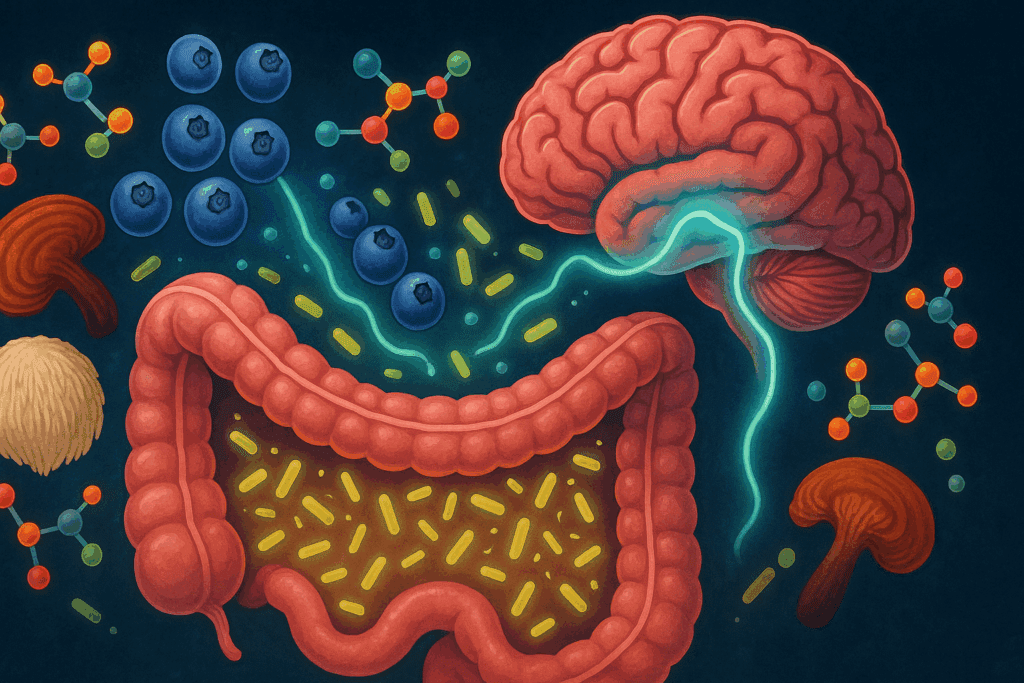
Gut Health, Adaptogens, and the Brain-Blueberry Connection
The gut-brain axis is a bidirectional communication network that links emotional and cognitive centers of the brain with peripheral intestinal functions. Increasingly, researchers are finding that dietary interventions that improve gut microbiota composition can have profound effects on mental health and energy regulation. Blueberries, as a prebiotic-rich food, support the growth of beneficial bacteria such as Lactobacillus and Bifidobacterium.
These bacteria produce short-chain fatty acids (SCFAs), which play essential roles in reducing inflammation, enhancing gut barrier integrity, and even modulating neurotransmitter production. For individuals dealing with chronic fatigue or anxiety, these microbiome-mediated pathways can be transformative. Furthermore, the improvement of gut microbiota through blueberry consumption may enhance nutrient absorption, ensuring that essential cofactors for energy production—such as magnesium, iron, and B vitamins—are adequately assimilated.
Interestingly, the role of adaptogens in stress and energy management mirrors many of the mechanisms seen with blueberry consumption. Adaptogenic mushrooms like reishi, cordyceps, and lion’s mane influence the HPA axis, reduce oxidative stress, and support cognitive resilience—functions that are also enhanced by blueberries. When combined, adaptogens and blueberries may have synergistic effects, offering a more comprehensive approach to stress relief and sustainable energy.
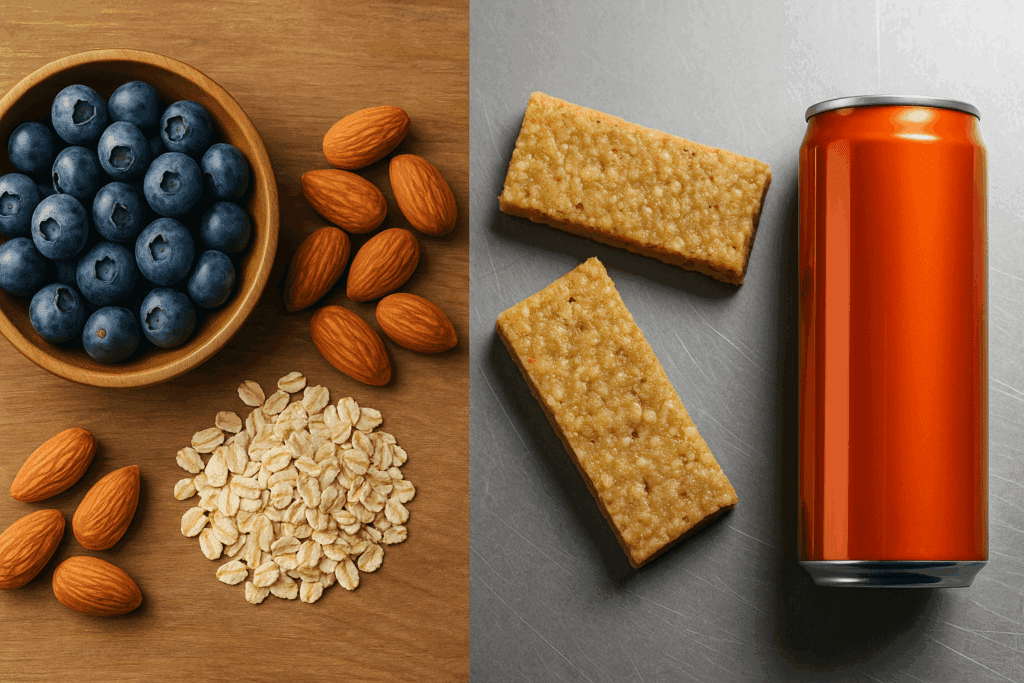
Blueberries vs. Common Energy Foods: A Healthier Alternative?
Many people turn to caffeine, sugar, or processed carbohydrates for a quick energy boost, yet these options often result in a crash that leaves them feeling worse than before. In contrast, the question “do blueberries give you energy” encourages a reevaluation of how we define energizing foods. Rather than providing a spike in adrenaline or blood sugar, blueberries support the underlying mechanisms that allow for consistent, sustained energy throughout the day.
The glycemic index of blueberries is relatively low, meaning they do not cause a rapid increase in blood sugar levels. This is crucial for individuals who are sensitive to glucose fluctuations, such as those with insulin resistance or adrenal fatigue. The fiber content in blueberries further slows glucose absorption, contributing to prolonged satiety and stable energy.
Compared to energy bars or sports drinks laden with artificial additives, blueberries offer a whole-food, nutrient-dense alternative. They are especially beneficial when paired with protein or healthy fats, as these combinations enhance nutrient absorption and prevent hunger-induced irritability—a common symptom of low energy or stress. This makes blueberries a valuable addition to meals or snacks aimed at supporting mental clarity, stamina, and emotional resilience.
Exploring the Cognitive Benefits: Blueberries and Mental Energy
Cognitive fatigue is a significant contributor to overall feelings of low energy, especially among individuals engaged in mentally demanding tasks. Blueberries have been extensively studied for their role in improving cognitive performance, attention span, and memory—all of which contribute to a subjective sense of mental energy. This ties back to the question “does blueberries give you energy” in the context of brain function.
Research involving school-aged children, older adults, and working professionals has demonstrated consistent cognitive benefits following blueberry consumption. These include improved executive function, faster reaction times, and enhanced working memory. These effects are believed to be due to increased cerebral blood flow and the neuroprotective properties of anthocyanins.
By enhancing brain plasticity and reducing neuroinflammation, blueberries support the neural efficiency needed to stay mentally sharp and engaged. This is especially valuable in high-stress environments where mental exhaustion can quickly translate into decreased productivity and emotional instability. Thus, incorporating blueberries into the daily diet can be a strategic move for enhancing both cognitive stamina and stress resilience.
Incorporating Blueberries into a Stress-Relief Diet
Understanding that do blueberries give you energy also invites us to think about practical applications in daily life. Blueberries are incredibly versatile and can be incorporated into a wide range of meals and snacks. Whether eaten fresh, frozen, or in powder form, their nutrient content remains relatively stable, making them accessible year-round.
For stress relief, combining blueberries with other calming foods—such as oats, yogurt, or chia seeds—can create synergistic effects. These ingredients provide complex carbohydrates, probiotics, and omega-3 fatty acids, which collectively support neurotransmitter function and mood regulation. Smoothies made with blueberries, adaptogenic mushroom powders, and a source of healthy fat like almond butter can serve as a powerful tonic for both energy and emotional balance.
Meal timing also plays a role in how effectively blueberries support energy. Including them in the morning or as a mid-afternoon snack can help stabilize blood sugar and provide a gentle lift in mood without overstimulation. This is particularly beneficial for individuals sensitive to caffeine or those managing chronic fatigue, anxiety, or adrenal dysregulation.
The Evidence-Based Verdict: Do Blueberries Give You Energy?
Taking into account the multifaceted benefits of blueberries—from mitochondrial support and cortisol regulation to improved cognitive performance and gut health—it becomes clear that the answer to the question “do blueberries give you energy” is a resounding yes, albeit in a nuanced and biologically grounded way. Unlike quick-fix energy solutions, blueberries offer a sustainable approach rooted in the principles of functional nutrition.
By targeting the root causes of fatigue—oxidative stress, inflammation, blood sugar instability, and neurotransmitter depletion—blueberries contribute to a more balanced and resilient internal environment. This not only enhances physical vitality but also fosters emotional stability and stress resilience, making them a valuable component of any wellness regimen.
Additionally, when paired with adaptogens and other nutrient-dense foods, the benefits of blueberries are amplified. This integrative approach aligns with the emerging field of psychonutrition, which emphasizes the importance of diet in mental health and cognitive function. As the scientific community continues to explore these connections, blueberries are likely to remain at the forefront of research into natural strategies for enhancing energy and reducing stress.
Frequently Asked Questions (FAQ): The Surprising Role of Blueberries in Stress Relief and Energy Support
How Do Blueberries Affect Daily Energy Levels in People with Chronic Fatigue?
Blueberries can provide valuable support for individuals living with chronic fatigue by addressing the underlying cellular dysfunction associated with the condition. While they are not a stimulant and won’t produce a jolt of energy like caffeine, their compounds assist in reducing mitochondrial oxidative stress and stabilizing blood sugar levels. This is especially useful for people whose fatigue is rooted in inflammatory or metabolic imbalances. Additionally, regular blueberry consumption can help buffer post-exertional malaise, a common issue in chronic fatigue syndromes, by enhancing resilience at the cellular level. Consistency is key—the cumulative effects of blueberries over time may offer more stable and reliable energy throughout the day.
Do Blueberries Give You Energy in the Same Way as Adaptogens Like Ashwagandha or Cordyceps?
While blueberries and adaptogens like ashwagandha and cordyceps serve overlapping purposes in energy support and stress resilience, they operate through distinct mechanisms. Adaptogens typically modulate the body’s stress response via the hypothalamic-pituitary-adrenal (HPA) axis and are known for normalizing cortisol levels. Blueberries, on the other hand, provide foundational nutritional support for cellular function and brain health. They enrich the diet with polyphenols and antioxidants that reduce inflammation and oxidative load, indirectly contributing to improved stamina. For those looking to enhance both immediate and long-term energy, combining adaptogens with blueberries may provide synergistic benefits without overstimulating the nervous system.
Can Blueberries Help Prevent Energy Slumps After Meals?
Yes, incorporating blueberries into meals can help prevent the common post-meal energy slump by promoting more stable blood glucose levels. Their low glycemic index and high fiber content slow carbohydrate absorption, preventing the rapid spikes and crashes often associated with high-sugar meals. Including blueberries in breakfast bowls or pairing them with whole grains and protein can lead to a steadier energy profile over several hours. This is especially useful for people with insulin sensitivity or reactive hypoglycemia. The gentle metabolic impact of blueberries makes them a strategic tool for maintaining productivity and focus throughout the day.
How Does Blueberry Consumption Impact Emotional Energy and Motivation?
Emotional energy, distinct from physical stamina, refers to the psychological resources required for motivation, resilience, and engagement. Blueberries contribute to emotional vitality by enhancing brain-derived neurotrophic factor (BDNF) levels and preserving neurotransmitter precursors like tryptophan. As a result, individuals may experience increased clarity, motivation, and emotional stability after incorporating blueberries regularly into their diet. These effects are subtle but significant over time, creating a mental environment more conducive to productivity and emotional regulation. When emotional energy is optimized, individuals often find it easier to stay motivated and engage meaningfully in both professional and personal activities.
Does Blueberries Give You Energy When Used in Smoothies with Other Superfoods?
Adding blueberries to smoothies alongside superfoods like chia seeds, flaxseed, or maca can amplify their energizing potential by creating a more complete nutritional profile. In this context, blueberries contribute antioxidants and natural sugars, while the additional ingredients provide healthy fats, fiber, and adaptogenic compounds. This combination ensures slower nutrient absorption and extends energy release over time. Moreover, pairing blueberries with plant-based proteins like pea or hemp protein can further support muscle recovery and metabolic health, making such smoothies ideal for post-workout or mid-morning fuel. So yes, does blueberries give you energy when blended into strategic superfood combinations—especially when tailored to an individual’s specific energy needs.
Do Blueberries Give You Energy Suitable for High-Performance Athletes?
Although blueberries are not a substitute for high-calorie performance fuel, they can play a crucial supportive role in the diets of athletes. Their potent antioxidant properties help combat oxidative stress from intense training, which can otherwise impair muscle recovery and endurance. Blueberries also improve endothelial function and blood flow, enhancing oxygen delivery to muscles during exercise. Regular consumption may shorten recovery time and reduce delayed onset muscle soreness (DOMS), making them an excellent choice for both pre- and post-exercise meals. For athletes seeking clean, natural sources of performance enhancement, blueberries offer a non-stimulant, nutrient-rich option that supports sustainable energy levels.
How Do Blueberries Support Hormonal Balance for Women with Stress-Related Fatigue?
Women experiencing stress-related fatigue often contend with fluctuations in estrogen, progesterone, and cortisol levels, all of which can impact energy and mood. Blueberries help support hormonal harmony by reducing systemic inflammation and supporting liver detoxification pathways that metabolize excess hormones. Their polyphenols also modulate estrogen receptor activity, which may help alleviate symptoms of hormonal imbalance such as irritability, low energy, and sleep disturbances. The mood-enhancing effects of blueberries may further stabilize emotional states influenced by hormonal changes. For women navigating perimenopause or high-stress life phases, incorporating blueberries daily could support a smoother hormonal transition and more consistent vitality.
Do Blueberries Give You Energy Through Gut Health Improvement?
Gut health is increasingly recognized as foundational to overall vitality, and blueberries contribute to this by acting as a prebiotic food that nourishes beneficial gut microbes. A healthier microbiome results in more efficient nutrient absorption, particularly of B vitamins and magnesium, which are critical for energy metabolism. Additionally, gut bacteria ferment blueberry fiber into short-chain fatty acids (SCFAs), which serve as a direct energy source for intestinal cells. The gut-brain axis also plays a role, as improved gut function positively impacts mood and cognitive sharpness. Therefore, when asking, “do blueberries give you energy,” it’s essential to consider their impact on gastrointestinal well-being as a major contributor.
Does Blueberries Give You Energy for Mental Focus and Long Study Sessions?
Blueberries can be particularly helpful for enhancing mental focus during extended periods of cognitive demand, such as studying or problem-solving. Their flavonoids have been shown to increase cerebral blood flow, especially to regions responsible for executive function and memory. This translates into improved attention span, quicker information processing, and better recall—all of which are critical for academic and professional success. Unlike caffeine, blueberries offer these benefits without causing jitteriness or rebound fatigue. So if you’re looking for brain fuel that supports endurance without overstimulation, blueberries may be a smart and sustainable choice.
What Are the Best Times to Eat Blueberries for Sustained Energy and Stress Relief?
Timing blueberry consumption strategically can maximize their energizing and calming effects. Eating blueberries in the morning can support a balanced cortisol rhythm, helping you feel more alert without spiking stress hormones. Midday is another optimal window, as a blueberry-rich snack can prevent the afternoon slump and stabilize blood sugar until dinner. Evening consumption, especially in combination with magnesium-rich foods, may support better sleep quality by aiding in neurotransmitter production. Rotating the time of day based on your lifestyle and stress patterns can help you tailor the energizing and soothing effects of blueberries more effectively across your daily routine.
Why Blueberries Deserve a Place in Your Daily Routine
In the pursuit of better health, more energy, and less stress, it is tempting to reach for supplements, stimulants, or even pharmaceutical interventions. Yet sometimes, the most powerful solutions are found in the simplest sources. Blueberries, with their rich array of phytochemicals and physiological benefits, represent an elegant example of food as medicine.
Incorporating a daily serving of blueberries—whether in a morning smoothie, a nourishing bowl of oatmeal, or an energizing snack—can serve as a cornerstone for stress resilience and sustainable energy. The growing body of evidence suggests that these small fruits exert outsized effects on mitochondrial function, cognitive performance, cortisol balance, and emotional regulation.
As more people seek holistic, science-backed ways to manage stress and reclaim their vitality, the question “does blueberries give you energy” is not only relevant—it is essential. The answer lies not in isolated nutrients or temporary fixes, but in the consistent, mindful integration of healing foods like blueberries into the fabric of everyday life. By doing so, we not only nourish our bodies but also cultivate the calm, clarity, and endurance needed to thrive in a demanding world.
Further Reading:
Energy Boosting Foods: 10 Fruits and Vegetables That Give You The Most Energy
Study Suggests Wild Blueberries Help Burn Fat
Recent Research on the Health Benefits of Blueberries and Their Anthocyanins
